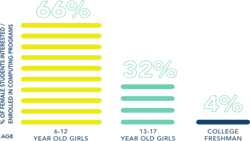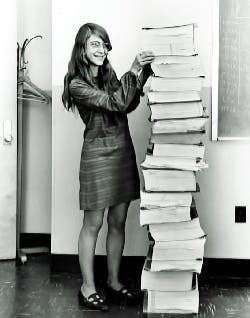The second Tuesday of October is internationally recognized as Ada Lovelace Day (findingada.com), shining light on the contributions of Augusta Ada Byron—better known as Ada Lovelace—in computer science, and recognizing the accomplishments of other influential women in science, technology, engineering, and math (STEM). At 17, Lovelace wrote an algorithm to be used with Charles Babbage’s Analytical Engine to generate numbers in the Bernoulli Series. For this accomplishment, she has been named one of the pioneers of modern-day computer science.
Unlike the majority of English women in the Victorian Era, Lovelace was encouraged from an early age to study mathematics and science. Support from her mother allowed her to develop a passion for problem solving that she employed throughout her lifetime. Pursuing a career in STEM required both confidence and resources in addition to an unwavering support system.
Studies from the National Science Foundation (NSF) show that women, blacks, Hispanics, and American Indians/Alaska Natives are underrepresented in science and engineering (S&E) fields. An NSF 2016 report shows that only 29% of jobs in S&E were held by women in 2013, with 15% holding engineering jobs, and 25% holding computer and mathematical sciences jobs (left). Since the computer-science workforce nearly doubled in the early 1990s, the number of women in this field continues to decline. A whitepaper from Techbridge cites an NSF paper from 2015 that shows minority women only earn 3% of engineering bachelors degrees, 5% of computer-science bachelor degrees, and 6% of physics bachelor degrees. The NSF describes the disparity of minorities and women in STEM work as "an underutilized source of human capital."
Google is trying to tackle the lack of diversity in Silicon Valley with its Code Next program in Oakland, California, to help black and Latino students gain skills to earn jobs at close technology hubs like Silicon Valley. Code Next teaches coding, game development, 3D modeling, and other computer-based skills. Google plans on opening another location for Code Next in Harlem in 2017.
Girls Who Code (GWC) is a program based in New York, NY that aims to preserve the interest of young girls in STEM as they enter adulthood. GWC offers after-school club programs to girls in grades 6-12, and also offers Summer Immersion Programs to 10th and 11th graders. The summer programs are held at leading technology companies like AT&T, Autodesk, and Microsoft. The programs are free, and GWC also offers stipends to cover living expenses and transportation for those who qualify for aid. The organization reaches 10,000 girls across the country. In 2015, 34 companies in 11 U.S cities hosted 57 Summer Immersion programs.

